Problems with the Release of Exotic Fish

Table of Contents
Don't Release Exotic Fish
Potential Problems
It Isn't Good for the Environment
Current Problems
Alternatives to Release
Don't Release Exotic Fish
Any plant or animal that is not native to the United States is considered an exotic species. Most fishes available for sale in pet shops are exotic and are imported predominantly from Central and South America, Africa, and southeast Asia. Each year, over 2000 species, representing nearly 150 million exotic freshwater and marine fishes, are imported into the United States for use in the aquarium trade. Fish culture in Florida also results in millions of exotic fish available for sale in the industry.
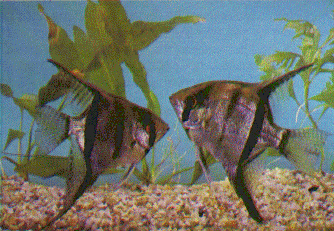
Common aquarium exotics - Angelfish.
Potential Problems
Unfortunately, a number of exotic fishes are released into the wild each year. Hobbyists may not be able to take their fish with them when they move, or they simply may lose interest in maintaining an aquarium. Fish may also be released if they outgrow th e aquarium or if they appear to be in poor health. Whatever the reason, releasing exotic fish into local waters is not a good idea. For one thing, it may be illegal. But there are sound biological reasons, too:
-
Released fish will be physiologically stressed upon introduction to a different environment.
-
They will be susceptible to parasites and diseases.
-
They might be attacked by native predators, such as larger fish, fish-eating birds, or water snakes.
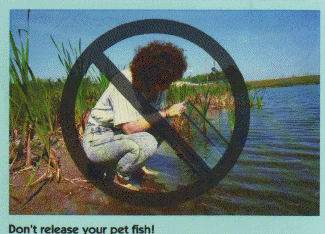
It Isn't Good for the Environment
-
If exotic fish survive and reproduce, they are difficult, if not impossible to control or eradicate.
-
They may cause changes in the existing aquatic community through competition with native species or predation on them, as well as through overcrowding or aggressive behavior.
-
They may infect native fish with exotic parasites or diseases.
-
An exotic may also affect the genetics of native species by hybridizing with them.
-
Sole species may pose a physical or public health threat, such as piranhas and freshwater stingrays.
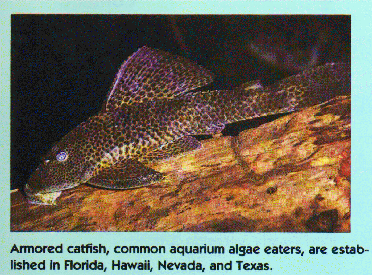
Current Problems Currently, at least 185 different species of exotic fishes have been caught in open waters of the United States, and 75 of these are known to have established breeding populations. Over half of these introductions are due to the release or escape of aquarium fishes. Because many of these fishes are native to tropical regions of the world, their thermal requirements usually prevent them from surviving in temperate areas. In the U.S., therefore, most introduced fishes have become established in Florida, Texas, and the Southwest. Examples include a number of cichlid, such as the oscar, Jack Dempsey, jewelfish, convict cichlid, Midas cichlid, and spotted tilapia; and livebearers, such as swordtails, platies and mollies, and armored catfishes. The goldfish, a native of China, is one of the few examples of a temperate aquarium species that is established throughout the U.S.
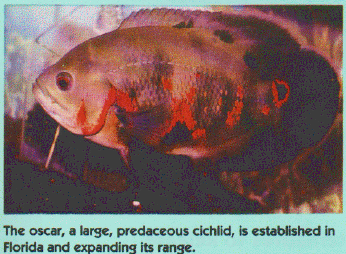
Alternatives to Release Instead of subjecting the fish to potentially harmful environmental conditions or risking potential ecological problems by releasing it, there are alternative means for disposing of unwanted pet fish:
-
Return it to a local pet shop for resale or trade.
-
Give it to another hobbyist, an aquarium in a professional office, a museum, or to a public aquarium or zoological park.
-
Donate it to a public institution, such as a school, nursing home, hospital, or prison.
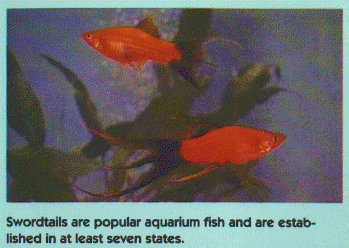
If these options are not available, a veterinarian or fishery biologist can euthanize it (put it to sleep) with anesthetic. You can also do this at home by placing the fish in a container of water and putting it into the freezer. Because cold temperature is a natural anesthetic to tropical fishes, this is considered a very humane method of euthanasia. A pet shop also may be able to assist you if euthanasia is the option you choose. An excellent discussion of fish euthanasia was published in the September 1988 issue of Tropical Fish Hobbyist. This magazine is available through pet shops or at your local library.
If you must give up your pet fish, please consider its well-being and its potential impact on the environment. Do not release it into a natural body of water.